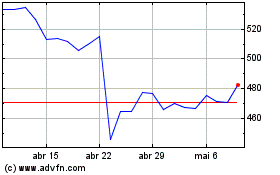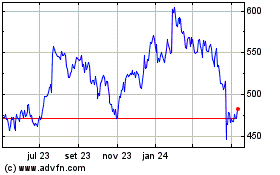How These Investors Saw Facebook's Privacy Scandal Coming
16 Abril 2018 - 9:29AM
Dow Jones News
By Asjylyn Loder
When Facebook Inc.'s share price tumbled last month following
reports that a voter-profiling firm had improperly obtained profile
information of tens of millions of users, many investors were
stunned.
But a handful of funds that pick stocks based on good governance
scorecards weren't at all surprised. They were forewarned by index
provider MSCI Inc., whose analysts wrote in a June report that
Facebook was "exceptionally vulnerable" to backlash from users and
regulators because of its focus on "monetizing personal
information." In fact, MSCI has singled out privacy practices as
one of its biggest risks since Facebook went public in 2012.
Facebook is down 6.8% this year, and those funds are beating
major U.S. stock indexes in part because they owned
smaller-than-usual slices of the beleaguered social-media giant, or
avoided it altogether.
Of course, any investor who steered clear of Facebook because of
MSCI's caution would also have missed the stock's huge gains: The
share price has quadrupled since going public.
Facebook offers a look at both the strengths and limitations of
picking stocks based on how well companies perform based on
environmental, social and governance criteria, known by the clunky
acronym ESG.
"You're taking the risk of missing out on short-term supernova
performance gains, but you're trying to insure your portfolio
against companies that are liable to implode," said Martin
Kremenstein, head of retirement products and ETFs Nuveen, the
asset-management arm of TIAA.
Nuveen is among a growing number of firms selling funds that
pick stocks based on ESG criteria. Some money managers use ESG
scores to help pick stocks, while others, like Nuveen, BlackRock
Inc., and Oppenheimer Funds, sell funds pegged to ESG indexes.
Research Affiliates LLC, the Newport Beach, Calif., asset manager
founded by investing pioneer Rob Arnott, launched its own ESG
strategy this month.
Proponents tout it as a feel-good way to beat the competition by
sidestepping potential pitfalls like Facebook. These loosely
defined strategies tilt their portfolios based on how well
companies score on issues like board independence, toxic emissions
or workplace safety.
The concept is popular in Europe and Asia, particularly among
big investors like pension funds and insurers, and it's catching on
in the U.S. Money managers and institutional investors applied ESG
criteria to $8.1 trillion in U.S. assets in 2016, an almost 31%
increase from 2014, according to a report from U.S. SIF, the Forum
for Sustainable and Responsible Investment. The organization is
currently collecting data for 2018.
It's an offshoot of socially responsible investing that attempts
to systematically evaluate businesses instead of just excluding
unlovable industries. To come up with the ESG ratings, analysts
from firms including MSCI, Sustainalytics and Thomson Reuters Corp.
scour news stories, financial records, regulatory filings and
company reports looking for hazards that traditional financial
analysis might miss. Each firm is assessed on the key risks facing
its industry, and those results feed into the overall rating.
Some notable successes include Equifax Inc., which in August
2016 was ejected from a family of MSCI indexes because of
data-security lapses. A year later, Equifax disclosed a massive
breach that sent its share price tumbling. And MSCI downgraded
Wells Fargo & Co.'s ESG score in November 2015, noting a high
level of customer-service complaints, months before the company was
fined for "widespread illegal" sales practices.
Whether those judgments will translate to better returns over
the long haul isn't entirely clear, in part because there's no
fixed definition of what constitutes an ESG fund. There's evidence
that such strategies may lag hot stocks during a runaway bull
market, but will be more resilient in a downturn, said Mr.
Kremenstein of Nuveen.
Take Nuveen's 16-month old NuShares ESG Large-Cap Growth
exchange-traded fund. The ETF invests in companies that get the
highest ESG scores from MSCI, so it has never owned Facebook. Last
year, as Facebook shares surged 53%, the NuShares fund lagged
behind the iShares Russell 1000 Growth ETF, which counts Facebook
as its fourth-largest holding, according to FactSet.
So far this year, the NuShares ETF has returned 4.3%, while
Blackrock's iShares growth fund gained 1.9%.
Write to Asjylyn Loder at asjylyn.loder@wsj.com
(END) Dow Jones Newswires
April 16, 2018 08:14 ET (12:14 GMT)
Copyright (c) 2018 Dow Jones & Company, Inc.
MSCI (NYSE:MSCI)
Gráfico Histórico do Ativo
De Jun 2024 até Jul 2024

MSCI (NYSE:MSCI)
Gráfico Histórico do Ativo
De Jul 2023 até Jul 2024
